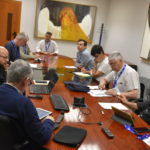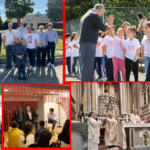Final message of the theological seminar held at ESIC University Madrid from May 7 to 11, 2023.
- Society changes so rapidly that we hardly have time to get used to anything new. The moment of one change has barely made its impact on our consciousness that it is replaced by another. And what happens to the important, enduring things? How can we proclaim the Gospel in such a changing world, where a market seduces us with promises of happiness that can be bought in the stores or online? At the end of the seminar “Towards an Economy for All: Inclusive, Sustainable and Just”, held in ESIC of Madrid from May 7 to 11, the participating members would like to share with you, brothers of the Congregation, the answers of these important questions. Fr. Dehon also had to think about how to proclaim and live the Gospel in his changing world. He took the risk to think, to consult with people who were in the world of industry, to deepen the nascent Christian social thought and, thanks to this effort, part of our spirituality was being forged.
- For a year prior to this meeting, the Continental Theological Commissions had to think about how to speak of an economy for all. They elaborated reflections where Justice, Sustainability, and Inclusion were taken into account as essential elements to live the Christian way. After a year, here in Madrid, the commissions conversed with a number of experts in economics and knowledgeable interlocutors who opened up our space for intercontinental theological dialogue. These encounters left us with three disturbing challenges that we believe must be deepened and worked on intellectually, pastorally, and spiritually.
- Is a just economy for all possible in the Anthropocene and in the plurality of cultures? For us it is possible and implies overcoming the imposed single economic vision of today. We are challenged to deal together in a synodal way with the diversity of the variant experiences, voices and visions, together take on the injustices of our economies. Words like “Ubuntu”, “Buen Vivir”, and the resurgence of the Commons, remind us that the Gospel must be thought in the current difficult, plural, but, at the same time, fascinating context. It is captivating because it is full of ideas, dreams, and different interpretations. Our challenge is to know how to repair the wounds caused by a dominant vision and to listen to each other in order to build a polyhedron of revealing voices and visions.
- Is sustainable and respectful development possible in a world characterized by a predatory economy? Rather than asking ourselves, is it possible, we are challenged to say that such a development is truly necessary. It is necessary to put our bets on a human and ecological economy, where nature is seen as a living space and not as a resource for financial profitability. It is necessary to think, implement and manage good practices in the use of resources in order to stop being predators of what belongs to the living community of the planet (water, land, vegetation, and fauna). Our challenge is to move away from the privatization of our Commons and to rethink oblation as a relational way forward given by the Spirit. Oblation is the opposite of predation. Oblation is respectful, sincere, docile, empathetic, and giving.
- Is an inclusive economic model possible? This is perhaps one of the greatest challenges. It cannot happen apart from the two previous aspects. It is possible to establish a fair system and not be deaf to those who think differently from us. We can build parks, and gardens, use clean energy, and buy the cheapest products made by companies that pollute in other countries. It is possible to soothe consciences through aid and, at the same time, build walls to defend our own against possible threats from outside. It is common to talk about human rights and, at the same time, to tribalize citizenship and residence permits to people coming from poorer countries. Inclusion is not an easy task. Tribalism is a great temptation to defend our goods. This is a great challenge: to recognize, know, love, and work on behalf of those who are different. It is an epochal challenge, which goes against the current, and requires leaving the tribal space, de-absolutizing private property, and betting on the Commons open to the different other, who must cease to be a stranger to become a brother and sister.
- The task of the Seminar is not complete with this gathering. The work must go on. The assembly invites therefore the Continental Commissions to take up the task of continuing the reflection of our spirituality and the economy and disseminating the results to the respective entities. Father Dehon’s Mission continue in our time.
Article available in:




